BANK OF ALBANIA
PRESS RELEASE
Governor Sejko: Address at the International Conference: “Economic Restructuring for Sustainable Development. Impact of Tourism in this Process.”
Publication date: 16.12.2023
Honourable Rector of Tirana University,
Dear Dean of Faculty of Economics,
Dear participants,
Thank you for the invitation and the honour to address the proceedings of this conference!
Allow me to state that my pleasure today is twofold.
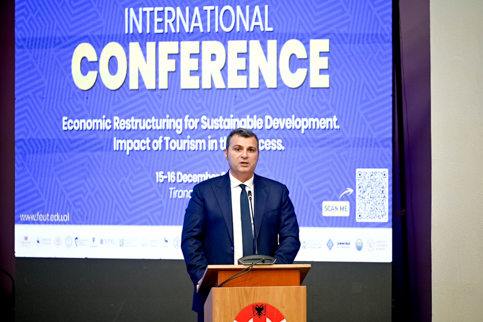
First, I am returning to the Faculty of the Economy at the University of Tirana. This faculty remains one of the most important educational institutions in Albania. It has educated many renowned scholars and interns, who have given a precious contribution to the developmental and transforming process of Albania.
Second, the topic selected for the conference is both contemporary and visionary. Albania has made a remarkable progress in its path towards development in the last three decades. However, this progress has been neither smooth nor linear, whereas the road ahead remains long and challenging. Thus, projecting a joint vision on the development priorities and routing an inclusive and consistent strategy to fulfil them, is an imperative process to reduce the time and the cost needed to reach progress.
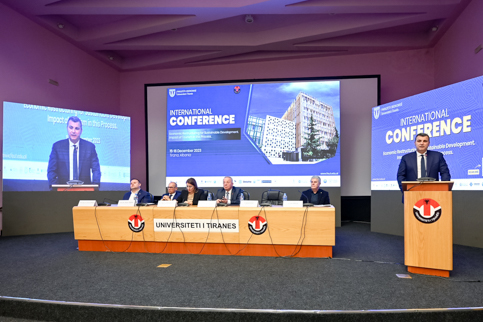
Based on the experience and the diversity of participants, I am convinced that this conference will provide a substantial contribution in going ahead with the agenda on development.
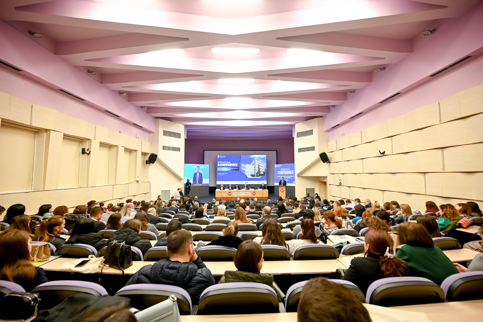
I will use the opportunity of this greeting speech to share with you some of my thoughts on the topic of economic restructuring and the sustainable development of Albania.
Dear participants,
From an historical perspective, Albania has made an outstanding progress in the last three decades. During this period, the income per capita in Albania has grown significantly, from an average of around US$600 at the end of 1990 to US$8000 in 2023. Consequently, in three decades Albania has gone from a low-income to a medium-high-income country.
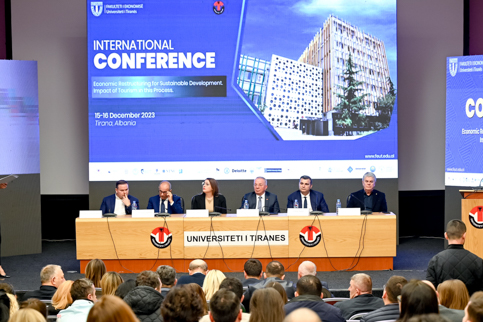
This progress has not always been smooth, but rather demanding. It has called for a radical change of the economic system, from a centralized economy to a free-market economy. Also, it has required an entire restructuring of the economy, as human and financial resources shifted from relatively unproductive activities and industries toward sectors that provide larger opportunities for growth and development.
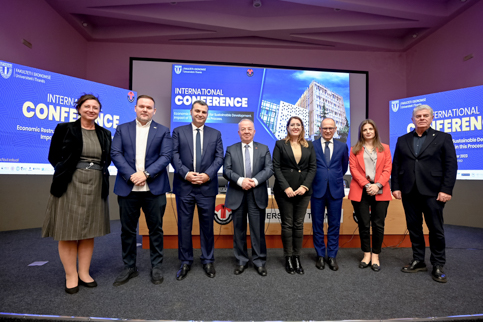
The continuous reconfiguration of the Albanian economy has boosted a significant growth in the relative share of services and construction sectors, and a corresponding decline in the share of both agriculture and industry sectors. Overall, these trends are leading toward a convergence with the economic structures of advanced countries. More specifically, the progress in services sector is underpinned by the inherent competitive advantages of Albania, whereas the construction sector is led by a need to improve the domestic infrastructure, in both qualitative and quantitative terms. On the other hand, the progressive decline in agriculture sector is in line with the specific challenges faced by this sector and the movement of the native population toward urban areas; whereas the industry sector has been curbed partially by the inefficiency inherited from the past, and partially by the failure to attract strategic investors.
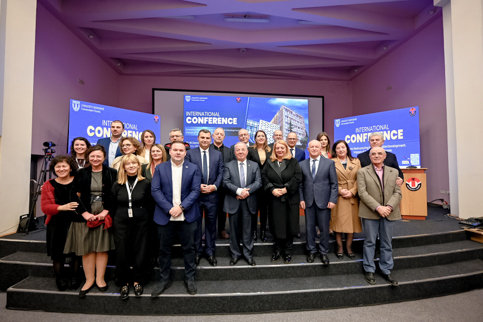
To return to the topic of this conference, I would like to emphasise that the development in the tourism sector is a successful story of the Albanian economy in recent years. Tourist inflows have expanded from ALL 1.2 billion in 2010 to ALL 2.8 billion in 2022, and are in the right path towards reaching ALL 4 billion in 2023. This journey is reflected by a gradual and incessant improvement in the balance of current exchanges in Albania, which has improved from a double-digit deficit figure at the beginning of the previous decade, to a surplus recorded in the first quarters of 2023. Given the regular investments in infrastructure and the continuous improvement of our supply in tourism, I believe that this sector will continue to bolster the economic and social well-being of the country in the future as well.
However, looking ahead, allow me to share some points based on the global and Albanian experience, which I think shall guide the future development of the economy.
First, the development and restructuring of Albania should be a joint effort from the public, private and financial sector all together. From my point of view, none of the sectors is able to proceed with the development agenda on its own, likewise none of the development strategies can be successful without the consensus and the support of each of these sectors.
In this context, it’s important to point out that private sector remains the primary actor for development. This sector has consistently proven to be more attentive toward development opportunities, more responsive and more efficient in using resources. However, the private sector should aim to continuously update their outlook regarding management practices, to further adapt to current challenges and rising competition, in the national, regional and European level.
In the same line, the financial sector plays an essential role regarding development. It should provide the required financial funds and products, as well as offer the needed consultation in the field of businesses and financial risk management. So far, I feel good to see that the banking sector - the dominating segment of the financial industry - has successfully accomplished this duty. Although still far off from the standards that we aim to reach, this sector has ensured, on a continuous basis, the necessary funds to the Albanian economy - during periods of extreme shocks, such as the ones experienced in the last three years, while simultaneously increasing the range of financial services. The sound financial balances of the sector, guaranteed by the prudential regulation and supervision adopted by the Bank of Albania, drive me to think that - in the future - the banking sector will remain an important promoter for development.
On the other hand, the main objective of the public sector is the ability to provide a stable monetary and financial environment, as a non-negotiable preliminary conditions for the long-term growth; to create a stable, clear, consistent and credible legal and fiscal environment; as well as to constantly provide investment in the physical infrastructure and human resources. In parallel, the public sector should be attentive toward the trends of development, provide short-term support for challenged sectors or medium-term stimuli for priority sectors, while avoiding the temptation to engage in long-term policies of sectoral development that go beyond the strategic sectors of national security.
Second, the development and restructuring of the Albanian economy should find a fair equilibrium between expertise and diversification. A diligent and dedicated expertise in those sectors or industries that have a competitive advantage due to the inherent natural resources or human investments, may pave the way toward fast development, which could, nonetheless, render the economy more sensitive against shocks. On the other hand, an extreme diversification renders the economy more stable against shocks, albeit more inefficient and less prosperous. Finding and maintaining a fair balance between these extremes is not an easy task. Larger economies might have the benefit of economic structures which are more diversified and complex, but for smaller economies - such as Albania - these alternatives are oftentimes impossible and unrealistic. Nonetheless, I am convinced that between the abovementioned two extremes, we will seek an economic structure which will enable a fast and stable development.
Third, a sustainable growth should provide a fair and balanced development for all the economic and social levels, as well as for all geographical regions. Each form of restructuring, be it natural or necessary, might create tensions between the various sectors of the economy or between different geographical regions, in the same way that a fast-paced development can deepen social differences. As policy-makers and as a society at large, I think, our joint efforts should focus on ensuring that the necessary processes of development cover all segments of the Albanian society.
Thanking you once again for your invitation, I wish you productive and successful proceedings of this conference!

 Twitter
Twitter
 Youtube
Youtube
 Facebook
Facebook
 Flickr
Flickr
 RSS
RSS
 Subscribe
Subscribe
 Feedback
Feedback